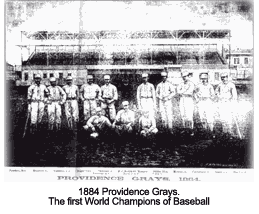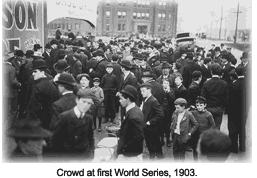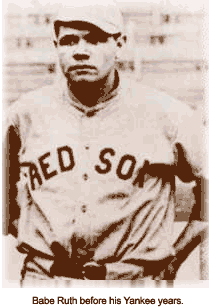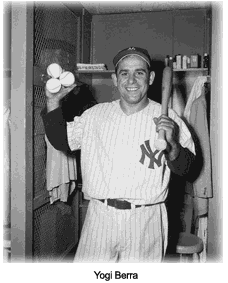The World Series, which has determined the championship of professional baseball every year but two since 1903, can be traced to a series played in 1884. The "modern" World Series was established between the American League and its older rival, the National League, in 1903 as part of a plan to regularize competition between the leagues. As the oldest championship series of any major professional sport, it has earned the apt sobriquet "Fall Classic."
 The first inter-league championship series was held in 1884 between the Providence Grays of the National League and the New York Metropolitan Club of the American Association. The Grays were victorious in the three-game match that was promoted as "The Championship of the United States." Several newspapers declared the Grays to be "World Champions," and the World Series was born.
The first inter-league championship series was held in 1884 between the Providence Grays of the National League and the New York Metropolitan Club of the American Association. The Grays were victorious in the three-game match that was promoted as "The Championship of the United States." Several newspapers declared the Grays to be "World Champions," and the World Series was born.
Six more series were played over the next six years, in formats that ranged in length from six to as many as 15 games, but in 1891, the American Association abruptly ceased its operations. The National League tried a championship series between the winners of the first half of the season against the winners of the second half, but it was not a hit with the fans and was dropped in 1893.
The emergence of the American League, formed in 1901 as a competitor to the National League, sparked a brief but intense competition for players and fans. An agreement to formalize and control the competition, entitled "National Agreement for the Government of Professional Base Ball Clubs," resulted in the first World Series (in 1903) between the two leagues that lead to the Boston Americans (later the Red Sox) winning by five games to three over the Pittsburgh Pirates.
 The 1904 series was not held because John T. Brush, owner of the National League champion New York Giants, refused to play the Boston Americans, who had again won in the American League. Brush declared that Boston was only the representative of the "inferior" American League and unworthy of the match. However, fans wanted to see the Series and by 1905, Brush had been forced to reverse himself. His Giants played the Philadelphia Athletics and won the Series by four games to one. This established the best-of-seven format that has prevailed since, with the exception of three years.
The 1904 series was not held because John T. Brush, owner of the National League champion New York Giants, refused to play the Boston Americans, who had again won in the American League. Brush declared that Boston was only the representative of the "inferior" American League and unworthy of the match. However, fans wanted to see the Series and by 1905, Brush had been forced to reverse himself. His Giants played the Philadelphia Athletics and won the Series by four games to one. This established the best-of-seven format that has prevailed since, with the exception of three years.
Boston's team from the American League was victorious in five of the first 15 series. They appeared in three of four series between 1915 and 1918, winning them all. Their star pitcher during this period was Babe Ruth, who set the record for consecutive scoreless innings that remained in the record books for decades. After the 1919 season, Ruth was traded to the New York Yankees, a team that had never appeared in a series before. The Yankees dominated the series for the balance of the 20th century, while Boston didn't win another series until 2004.
 One of the most memorable moments in World Series lore came in 1934, when the Yankees were playing the Chicago Cubs. With two strikes against him in the fifth inning of the third game, Ruth "called" his next home run by pointing to center field. He hit the next pitch about 500 yards, the longest home run in the history of Wrigley Field.
One of the most memorable moments in World Series lore came in 1934, when the Yankees were playing the Chicago Cubs. With two strikes against him in the fifth inning of the third game, Ruth "called" his next home run by pointing to center field. He hit the next pitch about 500 yards, the longest home run in the history of Wrigley Field.
The pinnacle of World Series pitching was achieved in 1956, when Don Larsen of the Yankees pitched a perfect game against the Brooklyn Dodgers. Larsen faced 27 batters and retired them all, which means none of them was able to hit his pitches. Not only was it the first perfect game in World Series history, it was the first no-hitter of any kind. It has remained the only no-hitter in postseason play.
In 1969, the Major Leagues inaugurated the League Championship Series, in which the two top teams from each league played for the right to represent their league in the World Series. Originally a five-game match, it was extended to seven in 1985. In 1989, another level of postseason play was added: the Division Series, which involved the three division champions and a wild-card team. In 1997, the Florida Marlins became the first wild-card team to win the World Series. In 2003, they won again, joining the New York Mets and the Toronto Blue Jays as the only expansion teams to win two series.
 For the first time since 1904, the World Series was canceled on September 14, 1994. Acting baseball commissioner Bud Selig canceled the remainder of the season, along with the World Series, due to a players’ strike that began on August 4, 1994. Selig announced the cancellation stating that it was because the players and owners had failed to come to an agreement about a salary cap or limit that the owners were demanding. At the time, major league players were averaging $1.2 million a year. The strike was settled later that year but the World Series was not played and thousands of people, from hot dog vendors to sports announcers, lost their jobs because of it.
For the first time since 1904, the World Series was canceled on September 14, 1994. Acting baseball commissioner Bud Selig canceled the remainder of the season, along with the World Series, due to a players’ strike that began on August 4, 1994. Selig announced the cancellation stating that it was because the players and owners had failed to come to an agreement about a salary cap or limit that the owners were demanding. At the time, major league players were averaging $1.2 million a year. The strike was settled later that year but the World Series was not played and thousands of people, from hot dog vendors to sports announcers, lost their jobs because of it.
In the 2004 American League Championship Series, the Boston Red Sox rallied from a 3-0 deficit to win in seven games. They thus became the first team in postseason history to lose the first three games of a series and win it. They continued to win against the New York Yankees, sweeping them in four games and becoming the only team ever to win eight straight games in the postseason.
A good indication of the inflation in sports can be seen by comparing the $1,182 that each member of the Boston Americans received for winning the 1903 World Series with the $163,378.53 that each member of the New York Yankees received for losing in 2004.
 The tradition of the World Series has lasted for more than 100 years, during times of world wars, The Great Depression, and prosperity. America anxiously awaits the "Fall Series" each year for those four to seven days in October that will determine the World Champions of baseball. And Yogi Berra, who played in more World Series games and collected more hits than anyone could attest to best, said, “It ain’t over till it’s over.” Until the last pitch is thrown, that winning determination cannot be known. No other sport in America has the draw that baseball has, despite the effects of the players’ strike during the World Series in 1994. The tradition of baseball lives on not only on the autumn diamond of the World Series playoffs but for the pursuit of greatness on the chalked fields at the local schoolyard or park.
The tradition of the World Series has lasted for more than 100 years, during times of world wars, The Great Depression, and prosperity. America anxiously awaits the "Fall Series" each year for those four to seven days in October that will determine the World Champions of baseball. And Yogi Berra, who played in more World Series games and collected more hits than anyone could attest to best, said, “It ain’t over till it’s over.” Until the last pitch is thrown, that winning determination cannot be known. No other sport in America has the draw that baseball has, despite the effects of the players’ strike during the World Series in 1994. The tradition of baseball lives on not only on the autumn diamond of the World Series playoffs but for the pursuit of greatness on the chalked fields at the local schoolyard or park.